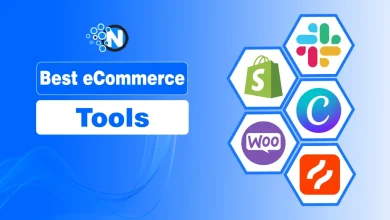Top 10 Best eCommerce Platforms in 2025

Starting an online store today is easier than ever, but choosing right eCommerce platforms makes all the difference between success and struggle.
With so many options available in 2025, each offering unique features, integrations, and pricing models, it can feel overwhelming to decide which one is right for you. That’s why I have put together a list of the top 10 best eCommerce platforms this year.
When you reach the end of this blog post, you will know exactly which one matches your business goals.
What is an eCommerce Platform?
An eCommerce platform is a software solution that enables businesses and individuals to create, manage, and operate an online store.
It provides tools to showcase products, process payments, handle shipping, and manage customer interactions in one place. With features like inventory management, analytics, and marketing integrations, eCommerce platforms make it possible to run a store without needing advanced technical skills.
Whether you are a small business owner, freelancer, or enterprise, an eCommerce platform gives you the foundation to sell products or services online effectively and efficiently. In 2025, it is estimated that the global eCommerce sales will touch the $6.8 trillion mark.
Top 10 Best eCommerce Platforms in 2025
Your eCommerce platform is the backbone of your online store. It manages everything from product listings and payment gateways to customer experience and analytics.
Picking the right one ensures scalability, smooth operations, and a professional online presence. If you choose poorly, you might face limitations that hold back growth. That is why it is essential to find the best eCommerce platforms to select the one that is most suitable for your preferences and requirements.

1. Shopify
Shopify remains the most popular eCommerce platform in 2025, and for good reason. I like how beginner-friendly it is while still offering advanced features for scaling businesses. You can create a professional store quickly, customize it with thousands of themes, and manage everything from inventory to marketing in one dashboard.
Its app store also makes it easy to add extra functionality as you grow. Whether you are starting small or running a large brand, Shopify is a reliable choice.
Key Features of Shopify
- Wide range of customizable themes
- Easy-to-use drag-and-drop store builder
- Extensive app marketplace for added features
- Built-in tools for SEO and marketing
- 24/7 customer support and tutorials

2. WooCommerce
WooCommerce is perfect if you want to build an online store on WordPress. What I like about it is its flexibility. You can customize your store however you like, due to plugins and themes. In 2025, WooCommerce continues to dominate the open-source space.
Further, it offers scalability and control without heavy subscription fees. If you are already familiar with WordPress or want complete control over your website’s functionality, WooCommerce is an excellent option for long-term growth.
Key Features of WooCommerce
- Full integration with WordPress
- Endless customization through plugins and themes
- No monthly subscription fees for core features
- Support for various payment gateways
- Scalable for small shops to large enterprises

3. BigCommerce
BigCommerce is built for businesses that want growth without technical headaches. I appreciate how it comes with its comprehensive built-in features like advanced SEO, analytics, and multichannel selling to make dropshipping exceptionally easy.
In 2025, it is especially popular among growing brands because it handles large product catalogs effortlessly. If you want to avoid relying on too many third-party apps while still getting enterprise-level features, BigCommerce is worth exploring.
Key Features of BigCommerce
- Scalable for businesses with large product ranges
- Built-in SEO and analytics tools
- Seamless integration with marketplaces like Amazon and eBay
- Multi-channel selling support
- Secure hosting and strong performance

4. Wix eCommerce
Wix eCommerce is ideal for beginners who want simplicity without sacrificing design. I love how its drag-and-drop editor makes creating a store feel effortless. Recently, Wix has expanded its eCommerce features with improved payment options, mobile optimization, and marketing tools.
If you are a small business or creative professional who wants to sell online without getting into complex technical details, Wix is a great fit.
Key Features of Wix eCommerce
- Simple drag-and-drop website builder
- Mobile-optimized store designs
- Built-in marketing and email tools
- Multiple payment gateways supported
- Affordable pricing for small businesses

5. Squarespace
Squarespace is known for its beautiful, modern templates, which make it one of the top dropshipping platforms for eCommerce brands that prioritize design. I find it particularly useful for creatives, photographers, and small businesses that want their store to look stylish and professional.
In 2025, Squarespace will offer improved eCommerce tools like inventory management, flexible shipping, and analytics. If your store’s aesthetics are as important as functionality, Squarespace gives you both in one sleek package.
Key Features of Squarespace
- Award-winning modern templates
- Integrated blogging and SEO tools
- Inventory and order management features
- Flexible shipping and tax options
- Mobile-friendly design and analytics

6. Magento (Adobe Commerce)
Magento, now known as Adobe Commerce, is a heavyweight in the eCommerce industry. I like how it provides unmatched customization and scalability for enterprises. With continuous improvements, it continues to be the go-to platform for large businesses that need complex features and total control.
While it requires technical expertise, its flexibility is hard to beat. It is not only an eCommerce platform but also counted among the best CMS platforms. If you are running a large operation with advanced needs, Magento delivers everything you could want in an eCommerce solution.
Key Features of Magento
- Full customization with open-source flexibility
- Advanced inventory and product management
- Strong scalability for enterprise businesses
- Integration with Adobe’s ecosystem
- Multilingual and multi-currency support

7. OpenCart
OpenCart is an open-source platform that gives you flexibility without the high costs. I like how lightweight and user-friendly it feels compared to more complex systems. In 2025, it remains a favorite for small businesses that want customization while maintaining ease of use.
Since it is community-driven, you get access to thousands of extensions. If you want affordability, flexibility, and control over your store, OpenCart is a smart option.
Key Features of OpenCart
- Free open-source software
- Lightweight and user-friendly interface
- Thousands of available extensions
- Multi-store and multi-language support
- No monthly subscription costs

8. Hostinger Website Builder
Hostinger Website Builder is a beginner-friendly platform that combines AI tools, customizable templates, and solid eCommerce features. It allows users to quickly launch websites or online stores without coding knowledge. The builder is lightweight, affordable, and comes bundled with free domain and SSL options.
With responsive designs, integrated SEO tools, and support for blogging and marketing features, Hostinger Website Builder is a practical solution for individuals, entrepreneurs, and small businesses looking for a straightforward way to go online.
Key Features of Hostinger Website Builder
- AI-powered tools for branding and content
- Simple drag-and-drop design editor
- Mobile-optimized online stores
- Affordable and beginner-friendly plans
- Built-in marketing and SEO support

9. Shift4Shop
Shift4Shop, formerly 3dcart, has positioned itself as a reliable solution for both small and medium-sized businesses. What I appreciate is that it offers a lot of advanced features without extra charges, which makes it very cost-effective.
This platform is especially popular in the U.S. due to its free plan tied to the Shift4 payment gateway. If you want a powerful platform that balances cost and features, Shift4Shop is definitely worth your attention.
Key Features of Shift4Shop
- Free plan with Shift4 payment integration
- Advanced inventory and product management
- Built-in SEO and marketing tools
- Multiple payment gateways supported
- Mobile-ready online store designs

10. PrestaShop
PrestaShop is another open-source platform that is widely used in 2025. What I like most about it is the balance between flexibility and community support. You can customize almost everything, and with thousands of modules, the possibilities are endless.
Although it may require technical knowledge, it gives you freedom without high costs. If you want control over your store without enterprise-level pricing, PrestaShop is an excellent option.
Key Features of PrestaShop
- Free open-source platform with no core subscription fees
- Thousands of modules for customization
- Multi-language and multi-currency support
- Strong community support for troubleshooting
- Flexible design options and scalability

Final Thoughts
These are the details about the top 10 best eCommerce platforms in 2025.
Choosing the right eCommerce platform is one of the most important decisions for your online business. From Shopify’s ease of use to Magento’s enterprise-level power and Zyro’s AI-driven simplicity, each option offers unique advantages.
The key is to align your choice with your goals, whether that’s growing a small business, managing a large enterprise, or starting a creative online brand. With the right platform, you can scale effectively, reach more customers, and run your online store with confidence.




